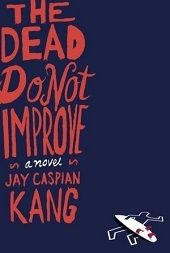Tuesday, August 7, 2012
TO-READ l The Dead Do Not Improve
Turns out, there's a reason why so many people buy and read and recommend bestselling books. Or to put it another way, why certain books become bestsellers. It's your classic "what came first," chicken or the egg, age-old-long debate (though after recently compiling CGB's own bestseller list and noting the conspicuous absence of some books that, like presidential nominees who you know were thrown a lot of money and attention at before admitting to having slept with numerous YA novels and smoking pot back in their early drafts, my mind is far from made up on this, obviously), and it's a vicious cycle, keeping quarters in the pockets of the "bigger" books hogging up the jukebox, while the wee ones wait patiently by the snack machine for a chance to hear "Free Falling" once.
That was more or less the topic of my previous review of a mystery novel (Gone Girl), which came to the conclusion that they sell, at least from time to time, because they're awesome. And now apparently I'm hooked. Not on bestsellers necessarily, which I'm still convinced are rigged, but mysteries. Which in itself could be the premise for a mystery, with teasers on the back like How did John Edward's mistress' tell-all end up at the top? What happened to the bookseller that everybody liked? How late is the post-office open till on Sundays do you think? What time is it in Austin? And so on, till it turns out that it's not, and that most people just like garbage, and that I was at home reading more than usual. I'll leave it to the pros but you can tell there's something there in a meta sort of way. (Which, I'll add, could function as the name of a confusing stretch of back roads in the novel.)
Anyway, I'm pretty sure the reason I'm so taken with these novels is they're both so far afield from your standard shoot-em-up and choke-em-back affair. How so? For starters, Jay Caspian Kang has appointed a recent MFA grad, would-be coffee jerk named Phillip Kim in the role of hapless suspect/detective, implicated by proximity to his next door neighbor's accidental death/calculated murder, whose inefficiency as a crime solver and a writer lends itself to fairly unsuspensful opening lines like, "we held to the credo that all young, privileged men in their twenties should never ever discuss their lives in any meaningful way. Our stories were about boredom, porn... talking dogs." Fortunately, Kang, himself a twenty or young thirty-something, isn't a subscriber to the world of disenchantment like a number of his actual machine-aged contemporaries, but an outside observer; a wallflower with more inside than meets the eye; traits we used to count on from our writers, back before blogs and book trailers when they could walk around the neighborhood talking to themselves without shoes on with some respect! So even though Kang's characters are removed at a safe, meta-like distance from themselves, trading insight for iconography, utterance for appearance, with the currency of movies, songs, and videos on You Tube, Kang refreshing commits, while his characters aren't looking, to the writing of a novel that is more than watched, but lived. So, for example, when Detective Finch (the real one, with the surfboard) thinks to describe the person standing next to him as "the forgettable baritone... had this been a boy band," it's not Kang who's slacking off in writing from his true and unique place in the seedy underworld of San Francisco, but the characters he's diligently and compassionately dedicated to. Which means that we as readers get the best of both worlds: The quick witted and oddly buoyant lethargy without the text-speak acronyms, the references to drugs and Google without the insistence that they dominate the inner lives of characters as well, the confusion and excitement and frustration of our day and age without the dystopian glaze of a too literal translation. And to top it off, the most satisfying theory and recrimination of Whole Foods I have ever read: "That's the accidental genius of this place They make a bunch of nine-dollar drinks, sell a bunch of fucking horse food and for twenty-five dollars, tacitly remind rich people of the possibility of misery, and then advertise a way out of it." Ha! Exactly!
The Dead Do Not Improve is smart but not too clever as to stand back from sincerity like a possible explosive. Rather just the opposite. Kang is less concerned with relaying information than remaining on good terms with his addressee, hinting again at the social pacts and understandings his work and demographic takes very seriously. Which are in fact perceived as tantamount to writing in the first place by many less great young writers of the 21st century. Their point being not to make but, out of desperation, to agree. And their books thus serving less as vehicles for creative expression than tollbooths checking all have paid their way down the same, shared, featureless stretch of sad highway. But Kang is up to something else. Hardly derisive of such efforts, which at least in admitting where things stand are noble, he is a few complusive steps away from the first page of jumping out of the car altogether, out of a different kind of desperation. He has to know what the ground feels like. And what's more, he has to say so.
Subscribe to:
Post Comments (Atom)


2 comments:
That's the accidental genius of this place They make a bunch of nine-dollar drinks.
Palm Beach Vending Machine
I'm very happy to discover this great site the future of this discussion is getting good and more useful for me. Thanks for sharing.
regards
Los Angeles Corporate Vending Machine
Post a Comment